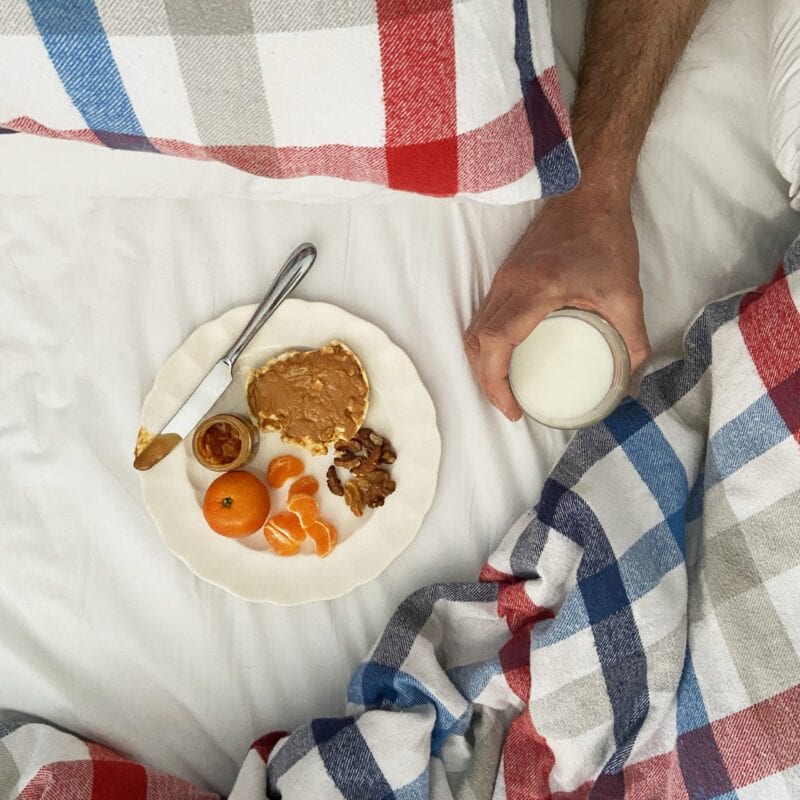10 Foods To Eat For A Good Night’s Sleep

Last Updated on 12th April 2020 by Mimi
A good sleep routine can be difficult at the best of times. So when you’re told to stay inside and you can’t keep up your usual rhythms, it’s no surprise that snoozing’s a struggle.
One way to get some control over our sleep is to look at what we eat and Gousto’s in-house dietitian, Ellie Bain has your back with a few simple tips for what to eat (and what not to) to get some shut-eye during this lockdown…
So how do you feed a good night’s sleep? There are three key nutrients to look out for: Melatonin, B Vitamins and Magnesium. These are found in so many foods, many that are probably already in your kitchen cupboard.
Melatonin
This naturally occurring hormone helps our bodies regulate sleep. It’s what makes you feel less alert and sleepier at night. Some foods high in melatonin are:
Almonds and walnuts
All nuts are a source of the sleep-regulating hormone melatonin, but these two are packed with the stuff! Try a handful after dinner, or add them to your meal. My favourite recipe for this is Asparagus Flaked Almond Risotto
Tart cherries
These little fruits also have tryptophan and anthocyanins too – components that can help the body make even more melatonin. If the sourness is not to your taste, try other fruits such as bananas, pineapple, and oranges, which are also delicious melatonin sources..
Milk
Evidence shows that a traditional glass of hot milk before bed can induce a good night’s sleep. Add a little ginger for extra flavour and wholesomeness.
B vitamins
B vitamins help regulate the body’s level of tryptophan, which is an amino acid important for maintaining healthy sleep. They also influence the production of that all important melatonin. Some of the best foods high in B vitamins are:
Complex carbs and whole grains are great sources of B vitamins. For a snack, swap sweets for popcorn, oatmeal, or wholewheat crackers with nut butter for great ways to add those into your day.
Spinach
Love it or hate it, this leafy green veg is packed with great nutrients for a good night’s sleep. To get the full benefits, eat the spinach raw. Or better yet, maximise the sleep inducing ingredients, and blitz it into a smoothie with milk, bananas and a spoonful of nut butter.
Chickpeas
There’s a good level of B vitamins in chickpeas meaning they can help regulate your sleep cycle. Eat them raw in a colourful salad or cook them up in a warming evening meal. My favourite recipe is our chickpea-filled Moroccan Vegetable Stew
Magnesium
This powerful mineral is known for calming the nervous system and preparing your body for sleep. A lack of magnesium has been directly linked to difficulty falling and staying asleep. Luckily, these foods are great for a boost of magnesium:
Oily fish
Oily fish such as salmon, tuna (fresh, not tinned) and mackerel are great sources of magnesium.
Quinoa
As well as being rich in magnesium, this grain is a nutrient powerhouse. Plus it’s so versatile and easy to add to your diet. Swap your oats in your breakfast porridge, and top it with your favourite fruits. You could throw it on a salad, or replace rice with it in a tasty stir fry for dinner. Here are some top tips on how to cook the perfect fluffy quinoa – How to cook the perfect fluffy quinoa
Rice
If quinoa isn’t your thing, wild rice and red rice are both good sources of magnesium. They’re also packed with other nutrients and high in fibre.
Sadly, some of our favourites may be getting in the way of our normal sleep cycle. The main culprits to watch out for are:
- Cruciferous vegetables – vegetables like broccoli and cauliflower are loaded with vitamins that are great for you, but they also have a lot of insoluble fiber that takes a while to digest, keeping your body working while you’re trying to sleep
- Dark chocolate – contains sneaky levels of caffeine, which should be avoided in the afternoon and evening if you’re struggling to get a good night’s sleep
- Orange juice – is not a good pre-bedtime drink for all the reasons you’d think. It’s extremely acidic and also very sugary, which can lead to heartburn. The sugars also give you a rush, keeping you awake
- Red meat – contains high levels of protein and fat which take longer to digest.
- White bread – refined carbs and sweet baked goods quickly break down into sugars, entering the bloodstream and giving you a sugar boost which can stop sleep.
Top tip: It can take up to four hours to fully digest a meal, so going to bed straight after a big meal can lead to indigestion or heartburn. You don’t want to go to bed hungry though as you’ll lie awake thinking about your stomach rumbling! A small snack before bed won’t disturb your sleep, so try having a handful of almonds.
Hopefully these tips help you get your forty-winks! If you have any other tips for a full night’s shut-eye share them with us in the comments below. Or if you’re looking for more tips check out Is What You Eat Affecting Your Sleep?

 MENU
MENU CLOSE
CLOSE